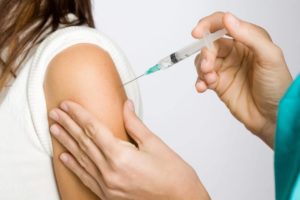
By Kathy Hubbard
Back in the olden days, when we were still allowed to socialize, I met a woman who told me that her son and daughter-in-law wouldn’t vaccinate their young children. She said that she was very upset about it and didn’t understand their motivation. Any conversation they had about their rationale ended with, “It’s our decision, Mother!”
The truth is that this young, well-educated couple isn’t alone. And, that’s a big concern now and maybe an even bigger problem when a vaccine for the coronavirus is developed if they and people like them continue to believe that vaccines are unnecessary.
“Vaccinations against life-threatening diseases are one of the greatest public health achievements in history,” an abstract published by the National Library of Medicine says. “Today, however, vaccines are becoming a victim of their success – many individuals have never witnessed the debilitating diseases that vaccines protect against, allowing complacency toward immunization requirements to build.”
They also say that the unfounded fear that vaccines cause autism and the fear-mongering of vaccine safety by some internet sites causes parents to be more concerned about the vaccines than the diseases they protect against.
Thanks to vaccines, diseases like smallpox and polio have been eradicated in the United States. Even individuals who haven’t been vaccinated are protected because the rest of us have been.
“There are certain groups of people who cannot get vaccinated and are vulnerable to disease: babies, pregnant women, and immunocompromised people, such as those receiving chemotherapy or organ transplants,” the Association for Professionals in Infection Control and Epidemiology say. “Herd immunity protects the most vulnerable members of our population.”
As we patiently wait for a vaccine for COVID-19, let’s look at the tried and true vaccines that benefit the health of our community. I’ve condensed this information from the pages of familydoctor.org:
DTaP protects against diphtheria, tetanus (lockjaw), and pertussis (whooping cough). All three of these diseases can lead to death. Diphtheria attacks the throat and heart, resulting in heart failure. Tetanus can lead to severe muscle spasms, while the cough of pertussis can make it hard to breathe, eat, and drink. Whooping cough can lead to pneumonia, convulsions, and brain damage. After initial inoculation, booster shots called TDaP are recommended every ten years.
Rotavirus vaccine prevents rotavirus, which causes diarrhea mostly in babies and young children. The diarrhea can be severe and cause dehydration, vomiting and fever. Hib vaccine helps prevent the serious illness called Haemophilus influenza type b which can lead to meningitis, pneumonia and a severe throat infection.
Polio was a serious, debilitating disease. Thanks to IPV vaccine, it’s a thing of the past. Or, at least it will be if our progeny are immunized. The disease caused muscle pain and paralysis of one or both legs or arms and often paralyzed the muscles used to breathe and swallow. Many children died.
MMR (measles, Mumps, Rubella) vaccines got a lot of publicity last year when several outbreaks of measles occurred among populations who didn’t believe in vaccinations. I’ve often wondered if they changed their tunes when these children became seriously ill and died.
Mumps can cause fever, headache, and painful swelling of one or both of the major saliva glands. Rarely it leads to brain swelling or testicular swelling in boys that may render them unable to have children. And, Rubella, aka German measles which manifests in a fever, rash, and gland swelling, can also cause brain swelling or a problem with bleeding.
The HBV vaccine prevents hepatitis B, an infection of the liver that can lead to cancer. Varicella vaccine prevents chickenpox, which you know can lead to shingles once infected. Human papillomavirus infection, which can cause cervical cancer in women and genital warts in both genders, can be prevented with the HPV vaccine.
The pneumococcal conjugate (PCV) vaccine protects against the common cause of ear infections, and meningococcal conjugate (MCV4) vaccine protects against four strains of bacterial meningitis.
The National Foundation for Infectious Diseases says, “The U.S. has the best post-licensure surveillance system in the world making vaccines extremely safe. There is extraordinarily robust data from many different medial investigators, all pointing to the safety of vaccines. Vaccines are among the safest products in all of medicine.”
Kathy Hubbard is a member of Bonner General Health Foundation Advisory Council. She can be reached at [email protected].

